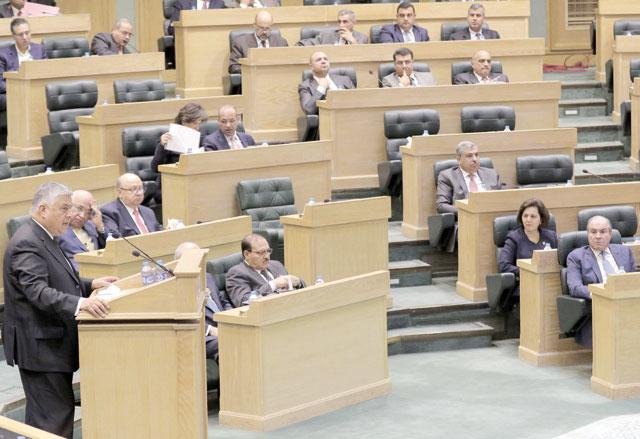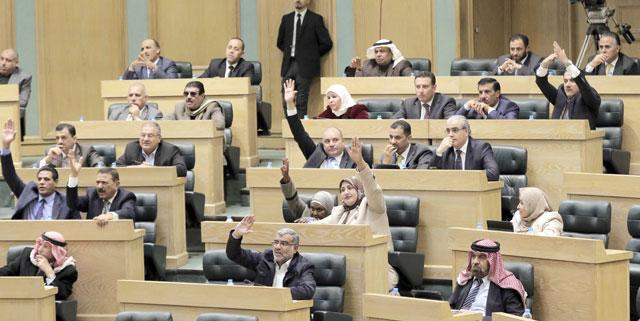You are here
Budget includes cash support to make up for lifting subsidies
By JT - Nov 27,2017 - Last updated at Nov 27,2017

Finance Minister Omar Malhas addresses the Lower House on Sunday (Petra photo)
AMMAN — The 2018 draft state budget law will include for the first time social safety network/cash subsidy with a value of JD171 million, Finance Minister Omar Malhas said on Sunday.
The money will make up for rising cost of living brought about by lifting subsidies on commodities that have been a fixture in the economic system for decades, mainly the bread subsidy.
Cash subsidy will be directed to all Jordanian families whose total annual income does not exceed JD12,000 and to individuals whose annual income is not more than JD6,000, providing that families do not possess two cars or more, or land and real estate with a value of more than JD300,000, Malhas explained.
In this regard, the minister, delivering the budget speech before MPs, said that the Finance Ministry will launch a website that allows beneficiaries to insert their information, where 2016 will be used as a base year for income, the Jordan News Agency, Petra, reported.
Civil and military employees and retirees, retirees of the Social Security Corporation and beneficiaries of the National Aid Fund will have the subsidy added to their monthly salaries, while other beneficiaries will receive the cash subsidy through a transfer to their bank accounts, he noted.
Meanwhile, Malhas expected the economic growth to stand at 2.5 per cent in 2018, and 2.7 and 2.9 per cent for the following two years, respectively, adding that inflation rates will drop to 1.5 per cent in 2018 and rise to 2.5 per cent in each of 2019 and 2020, compared to its current level of 3.3 per cent.
He underlined that the economic growth rate stood in the first half of the year at 2.3 per cent, and is also expected to continue at the same level until the yearend, noting that such rate is not enough to create jobs under an unemployment rate of 18.1 per cent.
The minister stressed that the government would carry on with plans to improve methods of tax revenue collections, curb tax evasion and stiffen penalties against evaders, while adopting a gradual elimination of tax exemptions on goods and services.
He expected the said corrective measures to be implemented by the government, including public expenditure control, to increase revenues by JD450 million in 2018.
As for local revenues, he expected them to stand at JD8.496 billion, compared with JD7.715 billion of re-estimated revenues in 2017, adding that current expenditures are estimated at JD7.886 billion and capital expenditures at JD1.153 billion in 2018.
The minister said that projects in the economic stimulation plan are earmarked an approximate sum of JD426 million, constituting 37 per cent of next year’s capital expenditures.
The after-grants deficit in 2018’s budget is expected to sway around JD543 million in 2018, dropping by JD209 million in the reestimated value in the 2017 budget, he added.
As for government units, Malhas said that their revenues are estimated at JD1.664 billion and their expenditures at JD1.812 billion with a deficit of JD148 million, noting that with the exclusion of the deficits of the Jordan Water Authority and National Electric Power Company, the deficit will turn into a surplus of JD185 million.
The minister noted that the combined deficit of the central government and government units will drop next year to JD831 million, down from JD1.035 billion in 2017.
As for the monetary situation of the Kingdom, Malhas said that foreign currency reserves at the Central Bank of Jordan reached $11.7 billion, which is enough to cover the Kingdom’s imports for seven months.
He added that the public debt until the end of 2017’s October totalled JD27.1 billion, which equals 95.3 per cent of the gross domestic product, which means that the government has succeeded in freezing the debt-GDP ratio at this level, yet the issue remains a “source of concern for the government”.
Malhas expected the general debt to equal 93.6 per cent of the GDP in 2018, before dropping to 90.3 and 86.2 per cent in 2019 and 2020, respectively.
After listening to the government’s speech, the Lower House referred the draft laws to its financial committee.
The house also referred several draft laws and amendments of laws and by-laws to the relevant committees.
Related Articles
AMMAN – The government on Sunday submitted to the Lower House the draft 2016 general budget law in addition to the bill governing the budget
AMMAN — The Lower House Financial Committee on Tuesday presented its report on the draft laws for the state budget and the budgets of indepe
AMMAN — The Lower House is scheduled to listen to the government’s presentation of the 2020 draft state budget law on Sunday, Speaker












